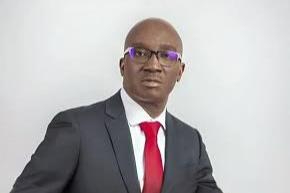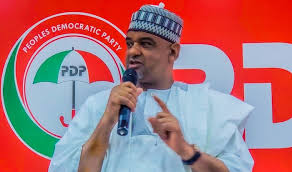NEWS
Edo Gov Increases Minimum Wage For State Workers

From Joseph Ebi Kanjo, Benin
Governor Monday Okpebholo of Edo State has increased the minimum wage for the state workers from N70, 000 to N75,000 to further improve their standard of living.
Okpebholo made the announcement while delivering his May Day speech at the Samuel Ogbemudia Stadium in Benin City Edo State.
The Governor, while appreciating the contributions of Edo State workers to the growth and development of the state, said his administration will always seek ways to improve the welfare of Edo workers.
Okpebholo noted that the Workers’ Day celebration is a special day set aside to honor the hardworking men and women who keep the state moving forward.
“Today, I am proud to announce that our administration has approved a new minimum wage of N75,000 per month for Edo workers.
“It’s our way of saying thank you, Edo workers. We believe this will make a real difference, and in return, we count on your renewed dedication as we build a better Edo together.
“Since assuming office, my administration has remained fully committed to the welfare of our workers.
“One of our first actions in office was to convert many casual workers, including over 1,000 cleaners who, for years, had no job security into the core civil service, giving them stability and peace of mind.
“We hired 500 new teachers to ease classroom pressure and help students learn better.
“We are also reviewing the casual position of over 3,000 Edo State teachers for possible full employment because their effort will shape our children’s future,” he said.
He continued: “We approved the recruitment of 450 clinical and non-clinical staff for our state hospitals and regularized 126 contract staff at Edo State Specialist hospital. These steps not only strengthen our health system but also improve job stability for health professionals.”
The Governor also used the medium to inform the public that his administration has cleared outstanding salary arrears owed to Edo State polytechnic staff.
“In the judiciary, we made sure that judges who had been delayed in their appointments were properly sworn in and now fully carrying out their duties.
“To show our commitment doesn’t end at retirement, we have also approved health insurance coverage for our retirees because we believed that our responsibility to workers doesn’t end when they leave active service.”
Okpebholo said his administration was committed to timely payment of salaries and pension; steady recruitment where needed to improve service delivery; staff welfare and development and ensuring that Edo workers are treated with dignity and fairness.
“As we mark this day, I joined His Excellency, President Bola Ahmed Tinubu, and my fellow governor’s in wishing all Nigerian workers a peaceful and fulfilling celebration. Your efforts shaped our nation and laid the foundation for a better tomorrow.”
Factional acting chairman of Nigeria Labour Congress (NLC), Edo State chapter, Comrade Bernard Egwekhide commended the governor for the formations and implementation of laudable policies and programmes towards alleviating the suffering and hardships faced by Edo workers and pensioners.
He noted that the theme: “Reclaiming the Civil Space in the Midst of Economic Hardship” was apt and thought provoking as it borders on the very serious challenges faced by the Nigerian workers and the people as a result.”
| ReplyReply allForwardAdd reaction |
NEWS
Nigeria Rescues 11 Stranded Miners From CAR

The National Emergency Management Agency (NEMA), in partnership with the Ministry of Foreign Affairs and Nigeria’s embassy in Bangui, has evacuated 11 stranded Nigerian miners from the Central African Republic (CAR). The miners were abandoned by their employer in the remote town of Bambari, after a distress video pleading for help went viral on social media.
A Sky Airlines Boeing 747-200 aircraft, registration number ET-AXO, conveying the returnees landed in Abuja at exactly 4:45 p. m. on Thursday. From the international wing, they were moved to the Hajj Terminal for formal reception, immigration clearance, and screening by relevant security agencies. In the viral video, the miners alleged abandonment and maltreatment by a Chinese mining company that recruited them for work in the French-speaking African nation. The footage showed six men appealing to Nigerians to help spread their message and draw the Federal Government’s attention to their plight. Their location was later identified as Senye, a village in the Bambari region of CAR. They were accompanied to Nigeria by the Nigerian Ambassador to CAR, Mr Babagana Ahmed. Welcoming them at Nnamdi Azikiwe International Airport, Abuja, NEMA Director-General, Mrs Zubaida Umar, commended the swift inter-agency response to the miners’ distress call. Represented by Air Commodore Kenneth Oyong, Director of Search and Rescue, she said security agencies, including the Office of the National Security Adviser and the National Intelligence Agency, played key roles. She noted the miners, who endured months of hardship without pay, were first relocated to the Nigerian ambassador’s residence in Bangui, where they received care before arrangements for return. On arrival in Nigeria, the miners were given meals, overnight accommodation, and money to assist in reconnecting with their families. She reaffirmed the Federal Government’s commitment to protecting Nigerians abroad, in line with President Bola Tinubu’s vision for prompt attention to citizens in distress overseas. Ambassador Ahmed confirmed the successful rescue and evacuation of 11 Nigerians stranded for eight months in a remote forest village under the Bambari region, 850 kilometres from Bangui. He recalled a viral video of July 24, 2025, in which the stranded Nigerians pleaded for urgent evacuation from Senye village. They had been recruited to work at mining sites but were later abandoned by their employer in the isolated forest area. Following swift intervention by the Nigerian Embassy, relevant CAR authorities, and the employer, the nationals were rescued and evacuated to Bangui on July 28. Since then, the embassy has provided them with accommodation, food, medical care, and other essential welfare support. The mission thanked the Minister of Foreign Affairs, the Office of the National Security Adviser, NEMA, embassy staff, and all stakeholders for their commitment to the evacuation process. “This rescue demonstrates the power of timely intervention and collaboration to safeguard Nigerians in distress,” Ahmed said. One of the repatriated miners, Oluremi Peters, recounted being stranded in CAR with colleagues. Peters said they were invited to CAR by a Nigerian associate and a Chinese national, who promised lucrative mining work. He said they arrived in September 2024 but were left idle for four months, with assurances that equipment would arrive soon. During this period, they were arrested by CAR police, suspected of printing money or being bandits, and detained for 16 days. After release, they worked on a road project and later at a mining site, facing payment disputes with the employer. “We were promised 450,000 CFA francs monthly, but received only 300,000 CFA for the first month and partial pay for the second,” he said. Frustrated, they made a video appeal to the Nigerian government, which he believes prompted swift intervention and repatriation. Peters thanked the Nigerian government and the CAR embassy for their support. He advised young Nigerians to research thoroughly and secure concrete offers before accepting overseas work. The miners’ safe repatriation reflects the administration’s resolve to protect its citizens wherever they are. Peters said the government’s swift action was commended as proof of its commitment to citizens’ safety and welfare abroad. (NAN)NEWS
FIRS unveils 16 certified tech firms for e-invoicing rollout

By Tony Obiechina Abuja
The Federal Inland Revenue Service (FIRS) has unveiled 16 technology companies certified to assist taxpayers in onboarding onto its electronic invoicing (e-invoicing) platform ahead of the revised November 1, 2025 deadline.The move is part of ongoing efforts to expand the adoption of the platform, which went live on August 1, 2025, and is central to enhancing tax compliance and real-time invoice verification.
According to the FIRS, the companies were vetted and certified by the National Information Technology Development Agency (NITDA) after meeting stringent technical and operational requirements, including nationwide service coverage, robust security standards, operational neutrality, and cross-sector performance capacity. The unveiling took place during a two-day workshop on the e-invoicing solution in Lagos, led by the Acting Director of Tax Automation, Mike Adoga.Adoga disclosed that the certified firms include Pasca Technology Limited, Hoptool Technology Limited, Etranzact International Plc, Telepac Africa Nigeria Limited, Cryptware System Limited, Namiri Technology Nigeria Limited, Ace of Spedes Consult Nigeria Limited, Jureb Business Solutions Limited, Qucoon Limited, Courteville Business Solutions, Softrust Technologies Limited, Westmetro Limited, Arca Payments Company Limited, and Remita Payment Limited.He stressed that taxpayers are free to choose any certified service provider and may switch if dissatisfied with service quality, urging businesses to promptly report any breaches or operational challenges to FIRS.While assuring that more companies will be added to the list as they meet certification criteria, Adoga warned that any provider found to have compromised the set standards would be delisted without hesitation.“There will be more coming, and the list will continuously be updated. If we find any service provider in breach of the conditions of service, they will be removed,” he said.In his opening remarks, Chief of Staff to the FIRS Executive Chairman, Mr Tayo Koleosho, represented by the Director of Change Management, Emmanuel Eze, revealed that over 1,000 companies have already been onboarded—representing only 20 per cent of the target 5,000 businesses.He noted that MTN, IHS, and Huawei are among the first to go live on the platform.Koleosho explained that the FIRS recently extended the onboarding and transmission deadline by three months, moving it to November 1, 2025, to allow more companies to meet integration requirements.He emphasised that the extension should not be seen as a reason for delay but rather as an opportunity to achieve smooth and voluntary compliance.The e-invoicing initiative is part of FIRS’ broader tax automation drive, aimed at improving transparency, reducing compliance costs, and curbing revenue leakages across the economy.NEWS
AfDB Commits $40m to boost Africa’s green infrastructure

By Tony Obiechina Abuja
The African Development Bank Group (AfDB) has announced $40m in blended capital to the Alliance for Green Infrastructure in Africa – Project Development Fund, anchoring the Fund’s first close of $118m.This milestone marks a new era towards mobilising blended capital in project development, to unlock a robust pipeline of investment-ready green infrastructure projects across the continent.
According to the bank, the AGIA-PD’s strong alliance of development finance institutions, public agencies, philanthropic organizations, and private investors includes KfW (the German development bank), the West African Development Bank (BOAD), the UK’s Foreign, Commonwealth & Development Office (FCDO), the Three Cairns Group, and the Soros Economic Development Fund. The bank’s strategic investment in the Fund — comprising $20m in grants, $10m in commercial equity, and $10m in junior equity from the Sustainable Energy Fund for Africa, which the Bank administers— underscores the Bank’s leadership in de-risking early-stage projects and catalysing private investment into infrastructure.“Through this $40m spanning grants, junior equity, and commercial equity, the African Development Bank is pioneering a comprehensive approach that will unlock Africa’s vast green infrastructure potential.“This investment represents more than capital. It is a bold declaration that the Bank stands ready to share early-stage risk alongside our partner.“The resources will be deployed for co-development with both emerging and established developers, ensuring a diverse and scalable pipeline.Our blended-finance model is designed to mobilise billions in private-sector investment for Africa’s low-carbon and climate-resilient infrastructure”, said the Bank’s Vice President for Private Sector, Infrastructure and Industrialisation, Solomon Quaynor.The Alliance for Green Infrastructure in Africa – Project Development Fund is part of the AGIA initiative, led by the African Development Bank, the African Union Commission, and Africa50.The initiative aims to raise $500 million, with $100m in grants for project preparation overseen by the Bank and $400m for project development through the Fund, to unlock a $10bn investment pipeline in strategic areas, including energy, sustainable transport, and ICT.“Since the unveiling of the initiative at COP27, the Alliance for Green Infrastructure in Africa has moved from ambition to execution, and this first close of the AGIA Project Development Fund is a powerful testament to that progress.“We are deeply grateful to our founding partners and investors for their trust and commitment. By unlocking early-stage capital, AGIA will help accelerate the development of bankable green infrastructure projects, strengthen local capacity, and pave the way for a more sustainable, resilient, and prosperous Africa.“Africa50 is proud to serve as fund manager and drive this vital initiative forward”, said Africa50 CEO, Alain Ebobissé, CEO.Minister of State for Development of the United Kingdom, Jenny Chapman, said, “We are partnering with countries to unlock private investment in the places hardest hit by climate change.“This is good news for local communities, helping create growth, and for the UK.“Today’s UK investment will support African-led projects like solar farms and water treatment plants, helping build stronger economies which can better deal with the effects of climate change


















